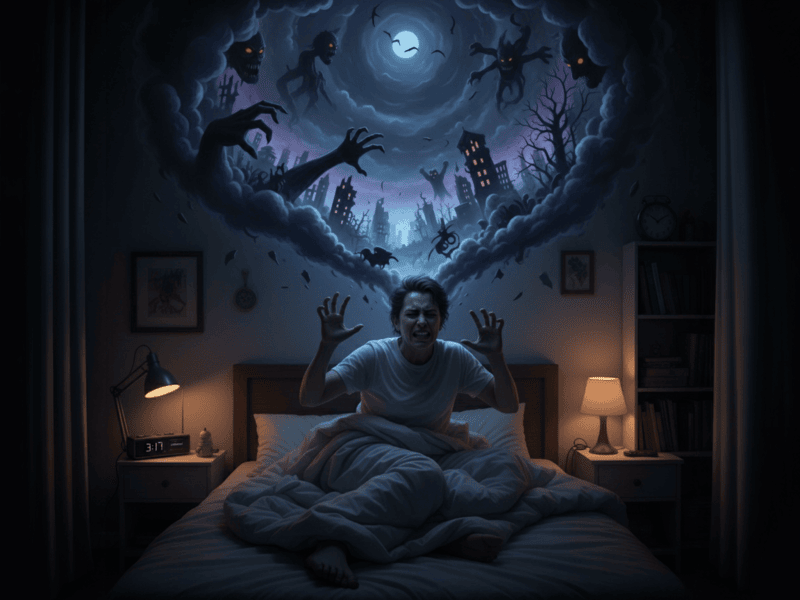I had a nightmare — what does it mean? Can something bad happen afterward, or can it be ignored altogether? In this material, I will try to present my own perspective on dreams and their interpretations. I hope it will help you in working with your dreams, teach you to approach them more deeply, and catch the meanings in complex dreams that our consciousness often interprets as nightmares. This vision is my own and is partly based on Jungian theory of working with dreams.
What are dreams?
In short, from a physiological point of view, dreams are the activation of brain areas that trigger visual and emotional images. From this arises the next question — what activates the brain? And why can this activation be so different: sometimes a dream is a pleasant flight, sometimes it is being in hell with monsters? Let’s take a closer look at this question.
According to Jung, dreams are a bridge between our consciousness and our unconscious, which is divided into the individual and the collective. Our unconscious does not understand human language at all and communicates with the conscious mind in the language of energies, which often have certain frequencies and emotional tones. Our consciousness strongly dislikes uncertainty, and when it receives this flow of incoming energies, it tries with all its might to decode it, to find meaning and structure in it, to create symbols that will correspond as closely as possible to that energy. The brain’s work of decoding this information is what we call dreams. Depending on which level of the unconscious the signals come from, the importance of the dreams will differ.
These levels can be divided as follows:
1. Physiology and psychosomatics — When we sleep, the body continues to function: conducting metabolism, diagnosing the state of the organism, performing restorative work, monitoring the work of internal organs, fighting bacteria and viruses, and much more. Some of these processes can activate certain brain areas, causing dreams.
The most well-known example: if you eat heavy food before sleep, in most cases you may have nightmares. Another example: during illness, a person may sleep poorly and also see nightmares, which in fact are visualizations of the stress the body is going through at that moment. Similarly, illnesses of the organs, respiratory tract problems, hormonal imbalances, chronic fatigue, and other physiological factors can also cause heavy dreams. Therefore, if you are having nightmares, the first thing to pay attention to is the state of your body.
2. Processing of experiences accumulated during the day — At this level, the brain actively processes the information received during the day and decides what can be deleted and what should be transferred from short-term to long-term memory. It also tries to fit this experience into its system of representations of the world, which is why it may mix new information with old data so that it does not fall out of the system. These bursts of activity create images, stories, emotions — what we perceive as dreams. Therefore, if the past day was full of tension, it may come into consciousness through a heavy dream or a nightmare. Thus, the second cause of difficult dreams is tense, emotionally complex, stressful situations during the day, which were not fully lived through, and in the dream they are completed and transformed.
3. The work of the individual unconscious — For me, this is the most interesting sphere, in which dreams are an invaluable source of information about the deep psychological processes taking place within us. These dreams often occur between 4–6 a.m. and can be distinguished by their depth — they are perceived as profound, saturated, energetically charged. In such dreams, frightening situations may be maximally plausible and indistinguishable from reality.
What can be learned from such dreams? A great deal: repressed and unlived life situations that left behind an intense emotional charge in the body, the shadow aspects of our personality, insights into the masculine/feminine part of our psyche, our main life scenarios (or our fate), deep psychic archetypes that govern our decisions, mental constructs and limitations, and much more. However, as I wrote above, this level of the unconscious does not communicate with us in an accessible language, but in certain energies that are transformed into symbols. Therefore, such dreams are a symbolic interpretation of inner psychic processes. And, for example, a frightening vision of one’s own death may be a symbolic representation of the death of some part of our ego-structure. Fortunately, you do not need to know the entire symbolism of dreams – you can simply use ChatGPT, asking for an interpretation of your dream according to Jungian analytical psychotherapy, and then inwardly feel how much this answer resonates with your inner truth about yourself. How much it reflects who you are at this moment in time. I think the results of this experiment will surprise you.
4. Ancestral stories — this realm lies on the border between the individual and the collective subconscious. Here, the subconscious works with the ancestral narratives of your family, and they often reveal themselves in dreams. Frequently, what you see is not your actual relatives but their archetypal representations, appearing as symbolic images: blood, the childhood home, the kitchen, a tree, heirlooms, and so on.
The primary purposes of the subconscious on this level are to heal ancestral stories or to provide you with guidance about what requires your attention within family relationships. In this way, hidden psychological wounds can be uncovered—wounds that have been passed down through generations and may live within you.
For example, during the war your great-grandfather endured the horrors of a concentration camp, and within him took root a primal fear of standing out in society, of being noticed and therefore destroyed. Such a fear may then echo through the generations and manifest in you—as a paralyzing terror of public speaking, one that you cannot rationally explain.
5. Access to the realm of the collective unconscious — The distinction between the individual and the collective unconscious is rather conditional. Since the symbolism of the individual often comes from the collective vocabulary, and the manifestation of certain energies in the individual (archetypes) originates in the collective. But the distinction is necessary, because for this type of dreams the main material comes from the collective unconscious, and such dreams are often revelations, prophetic. We can see the past of other people and events at which we were not present, or we can see events that will happen to us, to our loved ones, or receive warnings about global cataclysms. At this level, dreams are also wrapped in symbolic packaging, but due to their strong energetic charge, even through the packaging one can sense what the dream is about, and its essence is absolute truth for us — when we wake up, we know for sure that this event either has happened or will happen.
The average person rarely goes to such depths of dreaming, since there is much material on the previous levels and simply not enough time to “dive” this far in a single night. Nevertheless, at least a few times in life every person has such dreams.
For people who have thoroughly worked through the level of the individual unconscious, access to the collective level occurs much more often. There are also some exceptions — particularly sensitive individuals who perceive most of their dreams at the collective unconscious level.
If you believe that your dream was woven from the material of precisely this level and carried a heavy tone, then it is also necessary to understand two things. First, such dreams have a symbolic structure, and in most cases it will not happen exactly as you saw it. For example, not the death of a person, but the closure of your relationship with them and the “death” of that connection — figuratively, for you they are dead. Second, the interpretation of timeframes in these dreams is rather conditional. I suspect that this information comes from a timeless level, and what our brain perceives as an event that should happen soon, perhaps this month, may in fact occur in a year, five, or twenty years. In other words, the date of the event does not correlate at all with your sense of when it should happen.
I hope this information was useful and that you now have a greater understanding of what to do if you have a bad dream, and that a nightmare is not a curse but a signal of certain processes in the body and psyche that deserve your attention.







